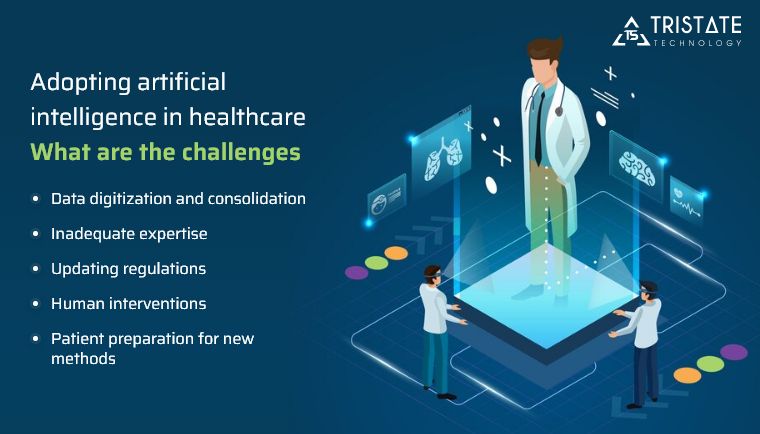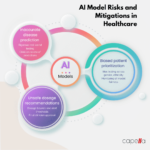The integration of Artificial Intelligence (AI) into healthcare promises to revolutionize how medical services are delivered, offering enhanced diagnostics, personalized treatment, and streamlined operations. Despite its transformative potential, the adoption of AI in healthcare is fraught with challenges that must be addressed to fully realize its benefits. These challenges span technical, ethical, and practical domains, impacting everything from data management to patient trust. This article explores the multifaceted challenges of AI adoption in healthcare, providing a comprehensive overview of the barriers to implementation and potential solutions.
Data Privacy and Security
One of the most significant challenges in adopting AI in healthcare is ensuring data privacy and security. AI systems rely on vast amounts of sensitive health data, including personal medical histories, genetic information, and real-time health metrics. The collection, storage, and processing of this data raise substantial privacy concerns, particularly given the potential for data breaches and misuse.
Healthcare organizations must comply with stringent regulations such as the Health Insurance Portability and Accountability Act (HIPAA) in the United States or the General Data Protection Regulation (GDPR) in Europe. These regulations mandate rigorous safeguards to protect patient data. However, as AI systems often involve multiple stakeholders and data sources, maintaining compliance and ensuring robust data protection can be complex. Encryption, secure data storage, and strict access controls are essential to mitigate the risk of data breaches and uphold patient trust.
Integration with Existing Systems
Integrating AI systems with existing healthcare infrastructure presents another significant challenge. Many healthcare providers use diverse and often outdated systems for managing patient information, including electronic health records (EHRs), laboratory systems, and imaging software. AI solutions need to seamlessly integrate with these disparate systems to be effective.
The lack of standardization in healthcare IT systems exacerbates this challenge. AI models require high-quality, consistent data to function accurately, but inconsistencies in data formats and interoperability issues can hinder their effectiveness. Developing and implementing interfaces and protocols that enable smooth integration between AI tools and existing systems is crucial for successful adoption. This process often involves significant time, financial investment, and technical expertise.
Algorithmic Bias and Fairness
Algorithmic bias is a critical concern in the adoption of AI in healthcare. AI systems learn from historical data, and if this data reflects existing biases or disparities, the algorithms can perpetuate or even exacerbate these biases. For example, if an AI model is trained on data from predominantly one demographic group, it may produce less accurate or equitable results for individuals from other groups.
Addressing algorithmic bias requires careful attention to data diversity and inclusivity. Ensuring that AI models are trained on representative datasets and regularly audited for fairness can help mitigate these issues. Additionally, involving diverse teams in the development and evaluation of AI systems can contribute to more equitable outcomes. Transparency in how AI models make decisions and ongoing monitoring are also essential for identifying and correcting biases.
Clinical Validation and Reliability
For AI systems to be integrated into clinical practice, they must undergo rigorous validation to ensure their reliability and accuracy. Clinical validation involves assessing how well an AI tool performs in real-world healthcare settings compared to traditional methods. This process is crucial for establishing the credibility and safety of AI systems.
However, clinical validation can be challenging due to the complexity of healthcare environments and the need for extensive testing across different patient populations and conditions. Additionally, the pace of AI development often outstrips the speed of validation processes, leading to potential delays in deploying new technologies. Establishing standardized protocols for validating AI systems and ensuring that they meet high standards of accuracy and reliability is essential for successful adoption.
Ethical and Regulatory Concerns
The ethical and regulatory landscape surrounding AI in healthcare is still evolving, presenting significant challenges for adoption. Ethical concerns include the potential for AI to make decisions that impact patient care without adequate human oversight. Questions about the transparency of AI decision-making processes, accountability for errors, and the potential for dehumanization of care are crucial considerations.
Regulatory bodies are working to develop frameworks that address these concerns and ensure that AI systems meet safety and efficacy standards. However, the rapid pace of technological advancement can outstrip the ability of regulatory agencies to keep up. Navigating the regulatory environment and ensuring compliance with evolving standards requires ongoing collaboration between healthcare providers, technology developers, and regulatory authorities.
Patient and Provider Acceptance
The successful adoption of AI in healthcare also hinges on the acceptance of both patients and providers. Patients may have concerns about the use of AI in their care, including fears about data privacy, the accuracy of AI-driven recommendations, and the potential loss of personal interaction with healthcare professionals. Building patient trust requires clear communication about how AI systems are used, the benefits they offer, and the measures in place to protect privacy.
Healthcare providers, on the other hand, may be hesitant to adopt AI technologies due to concerns about their impact on workflow, job security, and the quality of patient interactions. Training and education are essential for ensuring that healthcare professionals understand how to effectively use AI tools and integrate them into their practice. Demonstrating the value of AI in improving patient outcomes and enhancing clinical decision-making can help overcome resistance and facilitate acceptance.
The Future of AI in Healthcare
Despite these challenges, the future of AI in healthcare holds significant promise. Advances in technology, increased focus on data privacy, and ongoing efforts to address ethical and regulatory issues will drive the evolution of AI solutions. Collaborative efforts between technology developers, healthcare providers, regulators, and patients will be crucial for overcoming these challenges and ensuring the successful integration of AI into healthcare.
As AI continues to advance, it is essential to address the challenges of data privacy, system integration, algorithmic bias, clinical validation, ethical concerns, and acceptance. By tackling these issues proactively, stakeholders can pave the way for AI to enhance healthcare delivery, improve patient outcomes, and drive innovation in the field.
Conclusion
The adoption of AI in healthcare presents a range of challenges that must be addressed to fully leverage its potential. From data privacy and system integration to algorithmic bias and clinical validation, these challenges require careful consideration and collaborative effort. As the healthcare industry continues to evolve, addressing these challenges will be key to unlocking the transformative power of AI and realizing its potential to improve patient care, enhance clinical decision-making, and drive innovation in healthcare.



